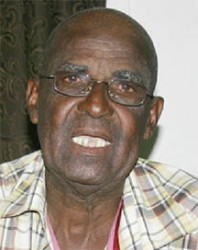By Jeff Trotman
Lindeners are set for another protest, this time over the closure of the Kara Kara Toll Point last Friday by Town Clerk, Jonella Bowen on an instruction from the Ministry of Local Government.
“We have a town clerk that is not sure, who she is working with,” Linden Interim Management Committee (IMC) councillor, Charles Sampson declared on Friday before the Toll Point was closed. “She seems to be working with the Minister of Local Government and not the Linden municipality. She has said that she will order that the toll point be closed in violation of what the council is saying.”
Sampson’s comments were made during a press conference on Friday, September 27, called by him and Eric Harry, Vice Chairman of the Linden IMC to give the municipality’s side of its impasse with the Ministry of Local Government with respect to the operation of the Kara Kara Toll Station. The press conference was called following an IMC emergency meeting to discuss the impact of the immediate closure of the Kara Kara Toll Point on the municipality’s ability to pay its workers.

It was disclosed that all the councillors, except two, voted for the municipality to continue operating the toll point. The two councillors who didn’t vote in favour were PPP/C representatives, Eon Halls, who voted against and Orin Wilson, who abstained.
In a notice in the September 29 edition of the Guyana Chronicle, the government said that the order enabling the municipality to levy tolls at Kara Kara had been revoked. It said that this had been communicated to the Linden Town Council by way of a letter from Minister in the Ministry of Local Government, Norman Whittaker to the head of the town’s IMC, Orrin Gordon.

“After having been in existence for many years, the order was challenged by a stakeholder who protested to Central Government and urged a review. A legal opinion obtained by government has deemed the order with its…by-laws `void and unenforceable’”, the notice said. It is unclear who the stakeholder is and who provided the legal opinion.
However, the notice in the Guyana Chronicle went on to say that “The Interpretation and General Clauses Act provides that all such orders and by-laws shall be published in the Official Gazette and shall come into operation on the date of publication, unless it is otherwise expressly provided that they shall come into operation on some other date.”
The notice added, “It has been determined that the by-law, which purports to authorize the toll fees on vehicles passing through Linden and more specifically over the Kara Kara bridge, was never inserted in the Official Gazette and consequently this by-law never came into operation as is required by the Interpretation and General Clauses Act.”
The notice, observers say, reflects that the government was delinquent since 1997 in terms of gazetting but that since this was a mere technicality the gazetting can be done and the toll restored.
Harry disclosed that if the Kara Kara Toll Point is closed and the Linden IMC does not get an annual subvention of about $60 million, the municipality would have to retrench workers from its already insufficient staff.
Stating that Whittaker had written to the Linden IMC about two to three weeks ago on the Kara Kara Toll Point, Henry said the town council had responded by informing the minister that the toll point was set up in 1997 by an order by then minister of local government Clinton Collymore for which a by-law was issued.
Laterite
Harry said that the response also informed Whittaker that he himself had signed a by-law in 2011, giving the Linden town council “additional authority to collect money from persons, who mine in the bush … the interior – fuel trucks and persons, who fetch materials such as sand and laterite, etc.”

Stressing that the most recent by-law was signed by Whittaker in 2011, Harry added: “Now, what he said to us is that he has rescinded all those by-laws and we must stop immediately. The council took a position at that point and said we will continue; we will not stop because: (1) we have implemented a minimum wage of $35,000 from 1 July and if we do close that checkpoint the impact will be so great that we might have to retrench workers.”
Pointing out that the revenue from that checkpoint averages $2.5 million to $3 million a month, Harry said it is of great assistance to the Council because “collection from the main revenue areas – rates and taxes, the markets and the bus stands – are very low and persons pay irregularly.”
Harry further stated that the town council had informed the minister that in its budget for 2013 it had made provision for revenue collection from the toll point and he had signed, approving the budget. Harry also said that the Linden IMC also informed Whittaker that it was willing to rescind the toll point if it is given a subvention of about $60 million a year but there was no response from the minister and the town council requested a meeting with him.
Harry said at that meeting on Friday, September 13, no decision was reached concerning the possibility of a subvention and the minister informed them that the Cabinet position is that the toll booth was illegal because it was not gazetted.
Noting that the chairman of the Linden IMC, Gordon, was in China, Harry displayed an e-mail that Gordon had sent from China on the very day of the press conference – Friday 27 September – in which Gordon stated that maintaining the booth is important not only to meet the salaries of employees but also to provide the various services to the community. “Apparently, these very real and valid arguments meant nothing to the decision makers by the government,” the e-mail states. “It’s highly discriminatory and lacks any meaningful alternative.”
According to Harry, the first by-law, which was set by Collymore, allowed the municipality “to collect from vending and lumber trucks only; that’s the one in 1997. The one in 2011 will tell you about containers, fuel trucks … this is the one that Mr Whittaker approved. He was minister and not junior minister.”
Harry stressed that the municipality will not close the Kara Kara Toll Station and it is willing to face litigation on the matter.
Sampson also lamented that the revenue to the municipality from the town “has always been unable to deal with the council’s expenses to the extent where, for example, the council’s security workforce, which should have a complement of fifty persons does not go beyond twenty because nobody wants to work for $22,000 and $24,000 a month”, which most of the town council’s workers earned before the implementation of the new minimum wage on 1 July this year.
“On the other hand, there are substantial housing areas in the community that don’t fall under the umbrella of the council in terms of rates and taxes,” Sampson said. He cited some areas in Linden such as Block Twenty Two and certain parts of Amelia’s Ward that do not fall under the tax umbrella of the town council. He said the government decided to do a valuation exercise so that all the areas can come under the tax umbrella but the valuation is being done “consistent with 1976, or 1978 value. Therefore, if you do the maths and they value 500 properties … you’ll see that those increases … would be insignificant”.
Sampson said something has to be done to enhance the revenue base “where the (town) council can pay its employees and do the things that a council should do as a council”. He said once the by-laws were passed, it was the responsibility of the ministers to have them gazetted. “If they failed in their duty, they really took long to realize that,” Sampson quipped. “They took over sixteen years to realize that.”
While he commended the government for implementing the new minimum wage, Sampson, however, said that the new minimum wage is the cause of the current problem between the Linden municipality and the Local Government Ministry.
He said that there were minimal complaints about the toll over the years. But the complaints increased and became strident after the council had decided to be more stringent in its revenue collection in order to meet the new wage bill following the announcement of the minimum wage from July 1.
He said that although the by-law made provision for the toll booth to operate twenty-four hours daily, it usually worked up to 7 pm and most of the trucks avoided paying toll by passing after 7 pm on their way to the interior. “You used to see them passing at night, some trucks heavily loaded with excavators. But now that the toll went into operation 24×7, many people get a problem. If you look at it, these people pass through Linden; they damage the roads that link Linden to other communities in the interior; they’re taking resources out of the Region such as sand, loam, bauxite overburden, laterite and they do nothing for the community. They drive recklessly on the roads.”
Sampson further alleged that the complaints are being made by “some friends of the government.” He added that they are not complaining that they have to pay higher tolls to pass through certain areas in the interior.
Noting that when the IMC decided to disobey the minister’s decision to stop collecting the toll, a letter was sent to the IMC threatening that court action would be taken if it continued to operate the checkpoint, Sampson said: “We were expecting the minister or the government would have sought some court injunction, or restraining order, stopping the IMC from operating the toll station.”








